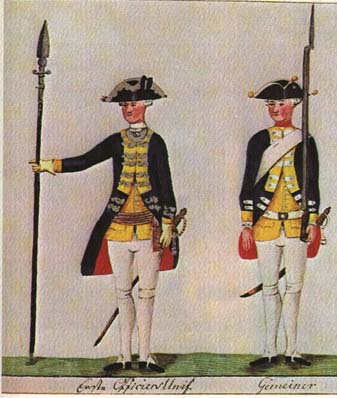
Hessian (soldier)
Hessians (US: /ˈhɛʃənz/ or UK: /ˈhɛsiənz/)[1] were German soldiers who served as auxiliaries to the British Army during several major wars in the 18th century including the American Revolutionary War.[2] The term is a synecdoche for all Germans who fought on the British side, since 65% came from the German states of Hesse-Kassel and Hesse-Hanau. Known for their discipline and martial prowess, around 30,000 Germans fought for the British during the war, around 25% of British land forces.[3]
This article is about troops from Hesse-Kassel and Hesse-Hanau. For troops from other German states who fought in the American Revolution, see Germans in the American Revolution.German Hessians
Attached but not incorporated into the British Army
- Battle of Long Island
- Landing at Kip's Bay
- Battle of Edgar's Lane
- Battle of White Plains
- Battle of Fort Washington
- Battle of Fort Lee
- Battle of Iron Works Hill
- Battle of Trenton
- Forage War
- Battle of Bound Brook
- Battle of Short Hills
- Siege of Fort Ticonderoga
- Battle of Hubbardton
- Siege of Fort Stanwix
- Battle of Bennington
- Battle of Staten Island
- Battle of Cooch's Bridge
- Battle of Brandywine
- Battle of the Clouds
- Battles of Saratoga
- Battle of Germantown
- Battle of Red Bank
- Battle of Gloucester
- Battle of White Marsh
- Battle of Barren Hill
- Battle of Monmouth
- Great Siege of Gibraltar
- Capture of Fort Bute
- Battle of Baton Rouge
- Siege of Charleston
- Battle of Connecticut Farms
- Battle of Springfield
- Battle of Mobile
- Siege of Pensacola
- Battle of Spencer's Ordinary
- Battle of Green Spring
- Battle of Groton Heights
- Siege of Yorktown
- Battle of Johnstown
- Raid on Lunenburg
While regarded, both contemporaneously and historiographically, as mercenaries,[4] Hessians were legally distinguished as auxiliaries: whereas mercenaries served a foreign government of their own accord, auxiliaries were soldiers hired out to a foreign party by their own government, to which they remained in service.[2] Auxiliaries were a major source of income for many small and relatively poor German states, typically serving in wars in which their governments were neutral. Like most auxiliaries of this period, Hessians served with foreign armies as entire units, fighting under their own flags, commanded by their usual officers, and wearing their existing uniforms.
Hessians played an essential role in the Revolutionary War, particularly in the northern theater.[5] They served with distinction in many battles, most notably at White Plains and Fort Washington.[5] The added manpower and skill of German troops greatly sustained the British war effort, though it also outraged colonists and increased support for the Revolutionary cause.[5] The use of "large armies of foreign mercenaries" was one of the 27 colonial grievances against King George III in the United States Declaration of Independence, while the Patriots used the deployment of Hessians to support their claims of British violations of the colonists' rights.[6]